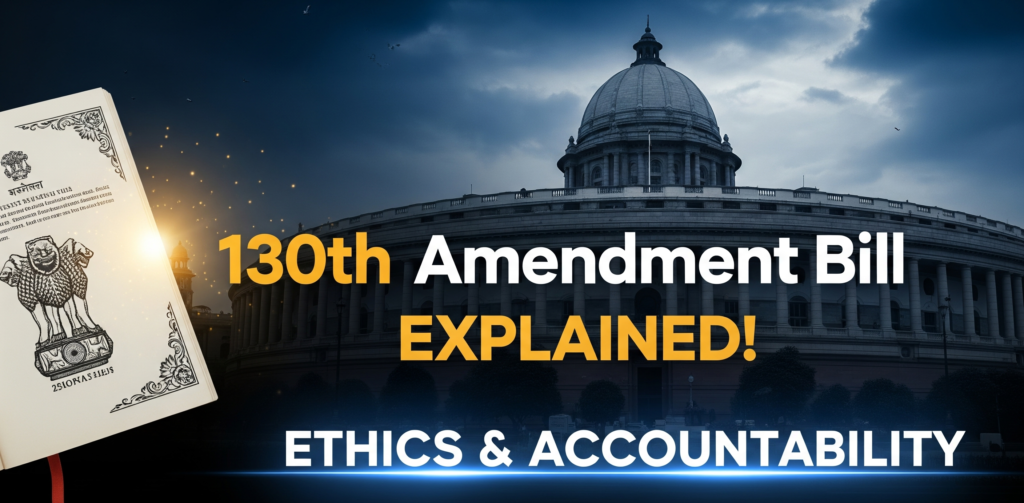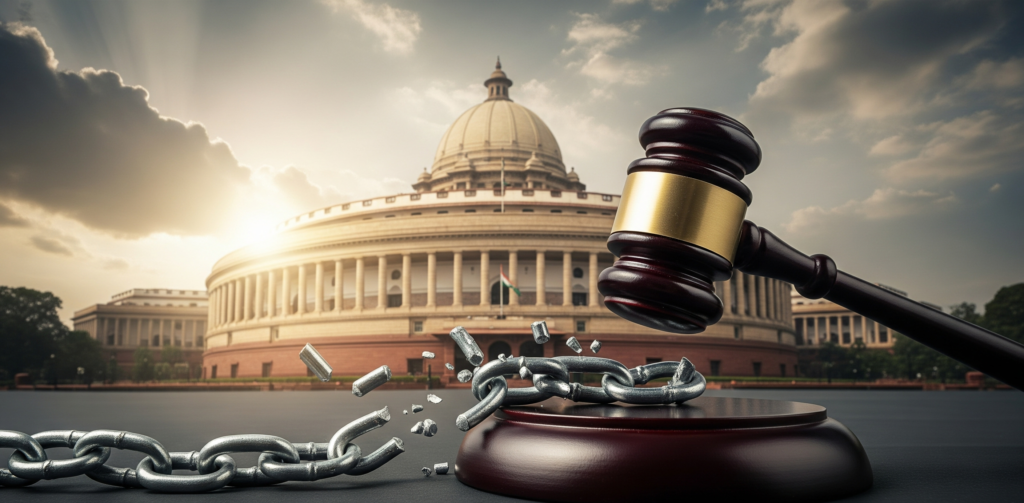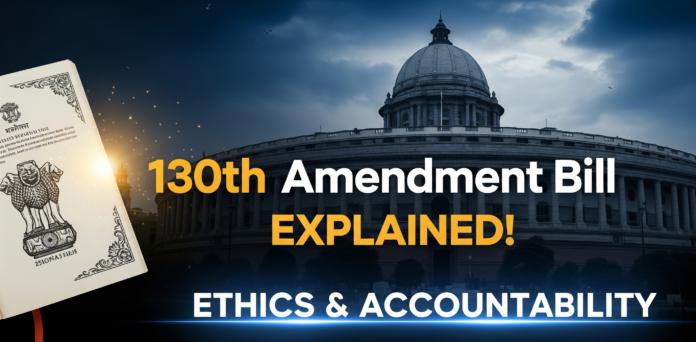
The Indian Parliament ushered in a landmark reform with the introduction of the 130th Constitutional Amendment Bill, 2025, aiming to enhance ethical governance and accountability in the country. This amendment focuses on curbing the criminalization of politics by mandating the removal of individuals holding high constitutional offices—including the Prime Minister, Chief Ministers, Union and State Ministers—who are detained or imprisoned for serious criminal offenses for over 30 consecutive days.
Key Provisions of the 130th Constitutional Amendment Bill
This constitutional amendment proposes changes to Articles 75, 164, and 239AA of the Indian Constitution, which outline the appointment and tenure of ministers at the Union level, State level, and National Capital Territory of Delhi. According to the bill, any minister or constitutional office-holder detained continuously for 30 days on charges involving imprisonment of five years or more will be automatically removed on the 31st day.
Importantly, this removal is enforced without requiring conviction or the conclusion of trial proceedings, marking a significant shift in how accountability is enforced. The amendment allows for the reappointment of such individuals if released from custody, thereby focusing on preventing governance from within jail during prolonged detentions.

Rationale Behind the130th Constitutional Amendment Bill, 2025
The primary objective behind the bill is to uphold constitutional morality and ensure clean governance by eliminating the possibility of detained ministers exercising power and authority. This amendment directly addresses growing public concerns about the nexus between crime and politics and seeks to restore faith in democratic institutions by promoting transparency and ethical leadership.

Controversies and Criticisms of 130th Constitutional Amendment Bill, 2025
While the 130th Constitutional Amendment Bill has been hailed for its intent, it has also faced criticism. Legal experts and opposition parties argue that removing ministers based solely on detention infringes upon the presumption of innocence, a core principle of the Indian judicial system. The bill risks penalizing individuals before they are convicted, raising concerns about potential misuse for political vendetta.
Additionally, critics warn that the bill could upset the balance of power, threatening federalism and restricting judicial independence. Calls for safeguards and judicial oversight have been made to prevent arbitrary application or misuse of the amendment.
Political and Legal Implications of 130th Constitutional Amendment Bill, 2025
If enacted, this bill would be the first constitutional amendment that explicitly regulates ministerial tenure based on detention status. It reinforces the imperative of criminal justice reform and urges political parties to reconsider their candidate selection processes to foster a cleaner political environment.
Further, this amendment is anticipated to spur improvements in the judicial system, encouraging faster adjudication of criminal cases involving public officials, thereby not only promoting justice but also stabilizing governance.
Way Forward for Effective Implementation
To realize the full potential of the 130th Amendment, the government must establish robust safeguards against misuse and implement transparent judicial mechanisms to monitor arrests and detentions of ministers. Political parties must also take responsibility by enforcing internal ethics and avoiding candidates with serious criminal charges.
Complementary electoral reforms, such as expedited trial processes for elected officials and stronger powers for the Election Commission, are necessary to create a holistic framework for ethical political governance.
Conclusion
The 130th Constitutional Amendment Bill, 2025 represents a bold and necessary step to align India’s constitutional framework with the demands of modern democratic accountability. By mandating the removal of detained ministers, it signals a clear shift towards clean governance and enhanced transparency. While challenges regarding legal principles and democratic rights remain, its prudent implementation could significantly curb the criminalization of politics in India.
FAQs: 130th Constitutional Amendment Bill, 2025
1. What is the 130th Constitutional Amendment Bill, 2025?
The 130th Constitutional Amendment Bill is a proposed amendment to the Constitution of India that mandates the automatic removal of persons holding constitutional offices (such as Prime Minister, Chief Ministers, Union and State Ministers) if they are detained for more than 30 consecutive days on charges involving imprisonment of five years or more.
2. Which constitutional articles does the 130th Amendment Bill seek to amend?
The Bill proposes amendments to Articles 75 (Council of Ministers at the Union level), 164 (Council of Ministers at the State level), and 239AA (special provisions for Delhi).
3. Who does this amendment apply to?
It applies to all persons holding constitutional offices as ministers in the Union Government, State Governments, and the National Capital Territory of Delhi.
4. What triggers the removal of a minister under this amendment?
Automatic removal from office occurs on the 31st day of continuous detention or imprisonment for an offense punishable with imprisonment of five years or more.
5. Does removal under this amendment require conviction?
No. The removal is based solely on detention duration under serious charges and does not require conviction or completion of trial.
6. Can a removed minister be reappointed?
Yes, the Bill allows reinstatement once the person is released from custody.
7. What is the main objective of the 130th Amendment Bill?
To uphold ethical governance by preventing individuals detained on serious criminal charges from continuing to exercise constitutional authority.
8. What are the criticisms of this Bill?
Critics argue that it violates the principle of presumption of innocence, risks misuse for political vendetta, and may upset federalism and judicial independence.
9. Why was this amendment considered necessary?
To address public concerns about ministers continuing in office while in detention, improving accountability and integrity in governance.
10. What is the current status of the 130th Constitutional Amendment Bill?
As of August 2025, the Bill has been introduced in Parliament and is under legislative scrutiny.




